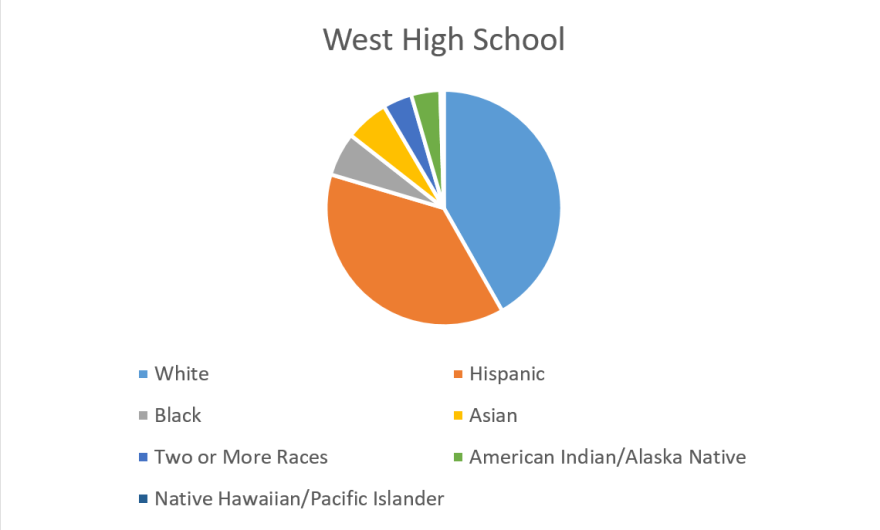On a cold Monday night back in January, the board of Sioux City Community Schools brought an issue to a vote.
Would they approve adjusting the school boundaries?
A roll call revealed six of the seven board members approved the change. It would even out the number of students attending the city’s three high schools. It would take full effect in about five years, as the board included a "grandfather" clause which would allow siblings to continue to attend the same school even if their boundary changed.
It would also make some of the schools more diverse. The last time the boundaries were changed so drastically may have been in the 1970s, the Sioux City Community Schools Superintendent Dr. Paul Gausman said. He added that Sioux City has the third largest district in the state.
"We needed to repopulate them in a way that would not only serve kids better, because we balanced out the numbers of kids in each school, but also that we're balancing out the number of kids with specific needs, whether that be language services, whether that be poverty based programs or things like that," Gausman said.
Board president Perla Alarcon-Flory was one of the members who voted for the change. She said the school board noticed North High School was bordering on overpopulation, while the other two had far fewer students. The city didn’t want to close any schools, and felt that redrawing the boundaries would do more than even out student populations.
Alarcon-Flory explained the board's thought process when making the decision: “But on the other hand, was also how do we make it more balanced about diversity?”
Alarcon-Flory was born, raised and educated in Mexico. She said she is the first Latino person to be elected to any office in Woodbury County. And she said there was a “huge need” to have the schools filled with people who look different and have different backgrounds.



“Again, it's not because they're better. It's because that's going to make us better. It's going to make us understand the reality of where we are," she said. "The reality is like, diversity doesn't make you lesser, on the contrary, in reality, it's good for everybody."
Gausman estimated he could probably count on one hand the number of parents who disagree with the new boundaries.
But as Sioux City attempts to add diversity to its schools, educators will also have to consider a new Iowa law. It would ban teaching certain “divisive concepts” in government agency diversity training and school curriculum. It sets limits on school lessons related to racism and sexism. The law may hamper some efforts by Sioux City school officials to talk about certain factors of diversity, according to board vice president Monique Scarlett.
She said back in the day when she was a student in Sioux City at West High School, she was the only African American in her classes (and a "proud Wolverine"). She said she feels it is unfortunate that some parts of history lessons may be glossed over. In her research, Scarlett said she has found it's possible legislators were backing away from topics that make them uncomfortable.

“That's not progress. That's regressing. And so I feel like what happened at the legislative level on our government is going backwards. And it's, again, it's taking away the history that needs to be told," she said.
Scarlett said at times, she felt "robbed" of learning about some of the history of her culture when she was in school, and doesn't want next generations to feel the same way.
"So that is something that I am pushing for, while I serve in this capacity, is to make sure that we have the right education, we have the right tools, we have the right resources, that every kid that attends our district, and is a part of our district, sees something they can relate to. Something of their culture," she said.
The law doesn’t actually prohibit teaching about subjects like slavery and sexism, but it does ban what it calls “race or sex scapegoating,” or teaching that someone can be inherently racist or oppressive. Fourteen other states have passed or are considering similar legislation.
Gov. Kim Reynolds has said it prohibits what’s known as critical race theory, although, that phrase isn’t specifically stated in the law.
Lisa Covington is with Black Lives Matter at School Iowa. She said more diversity in schools combined with regulations on teaching about racism and sexism, may make some educators afraid that they might step into illegal territory.
“This law really, is to provide a chilling effect for educators, right? To get them to kind of be concerned about the content of what they're teaching. And it is really, I think, part of the chilling effect is really to get folks to not do it, right? Just to self police and to avoid any of the concepts at all," she said.
Covington's research as a PhD candidate at the University of Iowa focuses on sociology of education. She also directs the Ethnic Studies Leadership Academy for Black Girls based in Iowa City. She explained there are subjects students should learn about in school, like instances when Black people were not afforded the same opportunities as white people. And she said learning about these circumstances can be beneficial for all students.
"It seems like there is a real fear around having students learn that information based on the bill, and the fact that schools and other state entities cannot teach these quote unquote "divisive concepts" or topics related to diversity," Covington said. "Students need to think critically, in general, and thinking critically about race relations and diversity really can allow them to gain an understanding of history that they might not have been exposed to before."
"It's just getting the facts. We just want the truth that has been suppressed for so long," Scarlett added.
As an example, Covington said instead of teaching about Black American novelist Alice Walker (known for The Color Purple), some teachers may only teach white novelist William Golding's Lord of the Flies.
Covington said a law such as the "divisive concepts" one may result in a lower retention rate for teachers in Iowa. To help, Black Lives Matter at School Iowa provides support and a community for Black students, teachers, administrators as well as helps educators navigate the new guidance.
And it’s the teachers who will most likely see the changes, according to Superintendent Gausman. He said he doesn’t know why the legislature decided to pass such a law, but he doesn’t think it will change the curriculum much. It will however, most likely change some of the training and discussions educators will have in the district.
He said the district, which celebrates 59 different countries represented by more than 15,000 students, will still value, and teach about, diversity.
“It's really important to know that of course, we’ll follow the law and we'll do everything that we can, but we are a district that has to do everything we can to help diversity and inclusion and equity," he said.
Outside of school, Black Lives Matter at School Iowa offers a virtual Saturday class every month in Black history for anybody in the state. And board vice president Scarlett said she’ll buy books for her grandchildren to make sure they learn everything they can about the history of the U.S.






